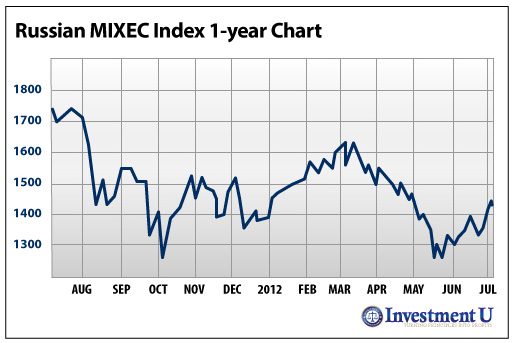 I’ve only recently returned from a two-week tour of the Baltics. Of the seven countries I visited, the most interesting was Russia – and not just because of the grandeur of the Peterhof Palace or the glories of the Hermitage (Russia’s answer to the Louvre).
I’ve only recently returned from a two-week tour of the Baltics. Of the seven countries I visited, the most interesting was Russia – and not just because of the grandeur of the Peterhof Palace or the glories of the Hermitage (Russia’s answer to the Louvre).
Russia is one of the world’s cheapest and most attractive emerging markets.
[ad#Google Adsense 336×280-IA]It’s a pity not one investor in a hundred in the West has a penny invested there.
Perhaps if they saw the big picture…
In 1980, developing countries accounted for just 30% of global economic growth.
Today they generate more than half. Emerging nations cover 77% of the world’s land area and represent 85% of the world’s population.
There are now 3.8 billion “middle class” people in the world today. And thanks to emerging market growth, that number is likely to double over the next 20 years.
As The Wall Street Journal reported recently:
“In the next 24 hours, approximately 180,000 people in developing countries will be moving from the countryside to cities such as Shanghai, Sao Paulo, Johannesburg. The same will happen tomorrow and every day thereafter for the next 30 years, the equivalent of creating one new New York City every two months. These men and women will need everything, electricity, water, food, healthcare, shelter, schools, computers and, of course, jobs.”
The investment implications here are stupendous. Yet I speak to many Americans who say their emerging market exposure is somewhere between meager and nonexistent. This is especially true of Russia, perhaps the least loved of the BRIC (Brazil, Russia, India and China) countries.
However, the world’s top emerging markets equity manager, Mark Mobius, is particularly high on Russia, even claiming in a recent interview that it’s his favorite market worldwide.
“Russia has been beaten down, has not really performed that well, the valuations are very good. The political picture is getting better. So I might pick Russia,” he said in the interview.
Why? Partly because Mobius, a dedicated value investor like his mentor John Templeton, likes to buy things cheap. Russia’s economy is dominated by the export of natural resources. Yet commodity prices have dropped precipitously this year – and so have Russian stocks.
The Russian stock market currently sells for less than eight times earnings, even though the economy is likely to grow at 3.5% this year and Putin has plans to deregulate several industries and boost infrastructure development.

Mobius calls Russian equities “too cheap to ignore.” Clearly, I’m not suggesting anyone bet the farm on Russian equities. That wouldn’t be prudent. But if you’re looking to put some risk capital to work in an undervalued market with good growth prospects, it could be a very wise bet.
Good Investing,
Alexander Green
[ad#jack p.s.]
Source: Investment U
